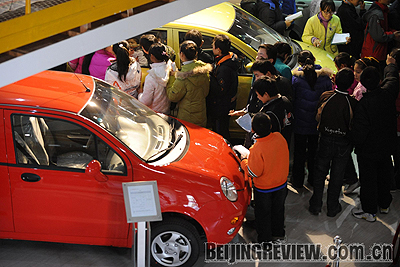|
|

RECOVERING DEMAND: The government expects the retail price cut in refined oil to bolster domestic demand and boost many industries, especially automakers such as Chery Auomobile Co. Ltd. of Anhui Province, which manufactures subcompact cars |
For some Chinese industries pummeled by the economic slowdown, this year's dynamic may be more about survival. Faced with high costs and anemic demand, their earnings outlooks seem to be up in the air.
But the good news is the government slashed the domestic retail price of refined oil at the end of last year, which is bound to buck up industrial gains and release some pent-up demand on the consumer market, analysts said.
The National Development and Reform Commission, the country's top economic planner, cut pump prices per liter of diesel, gasoline and aviation kerosene by about 18 percent, 14 percent, and 32 percent, respectively, starting from December 19.
This was the country's first cut in pump prices for motorists and other consumers since international prices took a sudden downturn last July. China's new refined oil prices may be relatively modest compared to Europe, but will still be much higher than in the United States.
The price cut was actually not unexpected as the government-dictated pricing regime had come under heavy pressure for keeping industrial costs high despite having helped cool down inflation in 2007.
"The oil-consuming enterprises can, therefore, save some costs," said Wu Jiandong, a well-known oil strategist in a statement. "Consumers will also be more able to increase spending."
Li Xunlei, Chief Economist at the Research Institute of Guotai Jun'an Securities Co. Ltd., agreed with Wu, noting that a number of downstream sectors, such as the automobile, transport and chemical industries, would gain some momentum from the price cut.
The airlines, in particular, would receive a boost from cheaper aviation kerosene and get an extra lift, because the government has delayed the imposition of a higher tax on jet fuel, Li said in a statement.
This had been a long-awaited boon for domestic airlines saddled by flagging demands and expensive jet fuel that accounts for around 40 percent of their total operation costs.
According to data from the Civil Aviation Administration of China, 70 percent of the country's airlines had reported losses in the first 10 months of 2008, totaling around 4.3 billion yuan ($627.7 million). Their margins are likely to turn positive this year as the price cut would save them around 27.5 billion yuan ($4 billion) in costs per year, said the Sinolink Securities Co. Ltd. in a recent report.
The move also could effectively offset the blow of a sharp drop in the fuel surcharges and leave the airlines some room to lower ticket prices, polishing their appeal to customers, said Zhang Lei, a spokesman of Spring Airlines Co. Ltd., in a statement.
Automakers also have welcomed the price cut, which they expect to spark a surge in sales activity in faltering markets.
| 